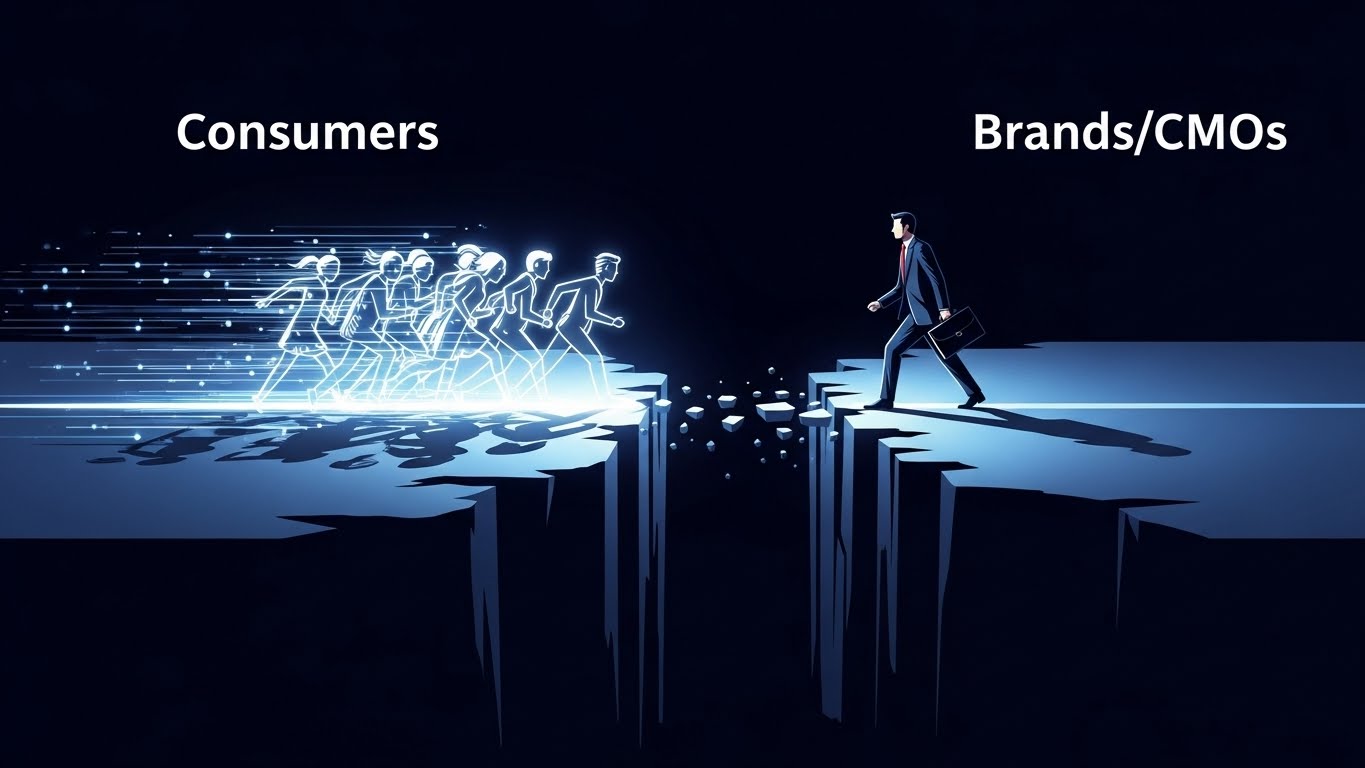Artificial Intelligence has moved from theoretical promise to transformative force. It is reshaping consumer behaviour, media interactions and the relationship between brands and audiences. A 2025 analysis by Cognizant and Oxford Economics projects that AI-empowered consumers could account for up to 55 per cent of spending in some categories by 2030.
Yet beneath this massive behavioural shift lies a quieter but growing problem: many Chief Marketing Officers still operate at pilot scale. The gap between how fast consumers adopt AI and how slowly brands prepare for it continues to widen. This gap is not just technological. It is strategic, cultural and structural. For many companies, it may soon become a liability.
Consumers move quickly, but marketers still test the waters
The Cognizant/Oxford Economics study highlights the pace of change. Consumers comfortable with algorithmic recommendations and automated decision-making will soon represent a powerful economic group.
On the supply side, organisations are adopting AI rapidly. Recent surveys show that 69 to 88 per cent of marketers already use AI tools across their operations. Most report better productivity, faster content creation and improved data processing.
However, adoption often remains shallow. Many brands keep AI confined to content generation, A/B testing or small workflow automations. A 2025 Gartner report found that although 65 per cent of CMOs expect AI to transform their roles within two years, only a small fraction say their early GenAI projects have produced meaningful commercial results.
In short: AI usage is widespread, but strategic integration is weak.
The preparedness gap: what real risk looks like
This disconnect carries several risks.
Brands may overspend on technology without preparing the ecosystem required to use it effectively. Consumers rely on AI to explore products, evaluate options and make decisions, while marketing strategies still depend on linear funnels and human-only interactions.
Operational lag becomes more visible. Companies struggle to scale AI beyond pilot programmes, losing agility. Talent gaps widen because teams continue to rely on outdated skill sets that do not match AI-driven workflows.
The real danger is clear. Companies risk being overtaken not by competitors, but by their own customers.
What the AI-empowered CMO looks like
Closing the preparedness gap requires a different type of leader. The AI-era CMO is part marketer, part strategist, part technologist and part ethicist.
Key attributes include fluency in AI, not just familiarity. CMOs must understand data structures, model capabilities, limitations and how to mitigate bias.
They must adopt a holistic approach that integrates AI across marketing, sales, product development, data management and customer experience, rather than confining it to isolated trials.
They also need agility, fast learning cycles and flexible resource allocation.
Ethics and transparency sit at the centre. As AI-driven personalisation grows, consumers demand fairness, privacy and clarity more than ever.
A recent Boston Consulting Group study found that over 75 per cent of CMOs expect generative AI to drive growth, not just efficiency. Many foresee revenue gains from AI-powered business cases. But BCG warns that marketers who restrict AI to internal tasks may miss the larger opportunity to reshape how customers experience value.
From experimentation to strategy: how brands can close the gap
Scaling from pilot initiatives to enterprise-level transformation requires discipline.
Start by auditing readiness. Map customer journeys and identify where AI can deliver real value through discovery, personalisation, friction reduction or predictive guidance.
Invest in talent and governance. Build capabilities in data science, AI ethics, operations and cross-functional collaboration. Create strong governance that protects privacy, addresses bias and ensures transparency.
Integrate AI across the marketing value chain. Use it in planning, creative development, media buying, customer management and retention. AI should enhance the process, not disrupt it.
Shift the metrics that matter. Move from outputs, such as content volume or clicks, to outcomes, such as quality of engagement, conversion lift, retention and lifetime value. Run controlled experiments and strengthen attribution.
Adopt a human-machine partnership. Let AI accelerate analysis and production while humans guide brand voice, emotion, cultural understanding and long-term strategy.
The AI era will reward the prepared, not the fastest
Consumer behaviour indicates that the next five years will favour brands that accept a simple truth: AI is not just a tool. It is a paradigm shift.
Winners will be those whose CMOs embrace AI and rebuild marketing frameworks around data integrity, ethical discipline, cross-functional integration and long-term value creation.
Those who treat AI as a checklist item risk irrelevance.
In a world where consumers trust AI to make decisions, marketers gain advantage only when they direct the technology with clarity, competence and strategic intent.
ALSO WATCH MARKETING EDGE ONTV






Comment
No comments found.